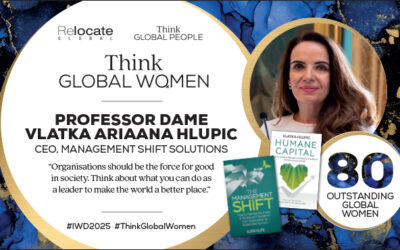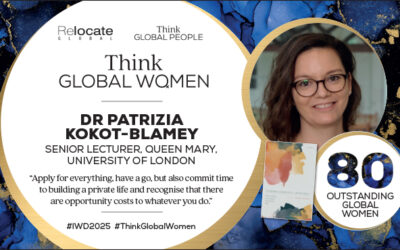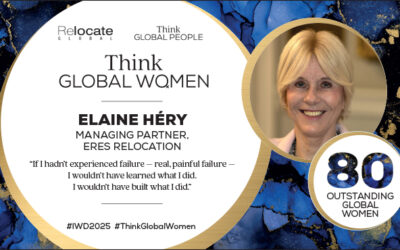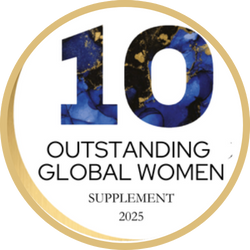Kay Kutt | 40 Outstanding Global Women 2023
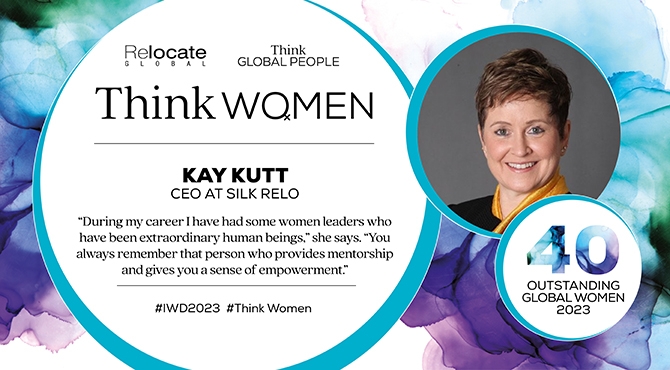
Leading in a changing world
Kay Kutt, CEO at Silk Relo, was “super shy” at school, but says that as she turned 30, she realised that asking questions and learning about people had the power to enhance her life and her career.
Kay, who is based in Hong Kong, had been Managing Director, Relocation Services Asia for Asian Tigers Mobility for 14 years. She was responsible for overseeing mobility in 14 countries and territories. When Asian Tigers rebranded in January 2020 as Silk Relo, she became CEO of the organisation.
“I realised at 29 that I had missed so many opportunities to learn, to inquire and to grow,” she explains. “It shows how you can develop and change. I never thought I would be on stage to deliver a speech, or that I would become a mentor to younger people.”
Behind her shyness, however, she had an entrepreneurial mindset, setting up her first company at aged 16 to clean offices. Nowadays, she says that her job as a leader is to create a work context which empowers people, give them the framework and the vision to work towards, and then “just get out of their way”.
“During my career I have had some women leaders who have been extraordinary human beings. You always remember that person who provides mentorship and gives your a sense of empowerment.“
“If you know what your true north is and what your mission and vision is, then it is quite easy to deliver,” she explains. “It is when we don’t manage people’s expectations that our life becomes more stressful and complicated.”
Kay is part of a globally mobile family and has moved 25 times, never having lived in a house for more than four years at a stretch. As a young girl, her father took her on business trips and to conferences, which broadened her horizons and gave her a fresh lens with which to view the world.
A British passport holder, she was born in Canada after her parents emigrated in the 1950s. Her father was a helicopter pilot who eventually became president of the company he worked for. She attended York University in Toronto and achieved a joint Fine Arts degree in Ballet and Geography, and also studied in the Middle East, but rather than becoming a professional dancer or opening her own ballet academy, she moved to Hong Kong to work with her brother who was running a company there. There she met her husband and the couple spent time in the United States before moving back to Hong Kong.
“During my career I have had some women leaders who have been extraordinary human beings,” she says. “You always remember that person who provides mentorship and give you a sense of empowerment.”
Prior to being in the Relocation world Kay was with business centre operators based in Hong Kong such as the Shui On invested HQ business centre. She then joined Regus leading their operations teams throughout Asia.
“I started in the Relo business with Cendant (now known as Cartus) in the capacity as their Asia Pacific Managing Director in HK in 2000; then joined Paragon as their MD Asia Pacific and relocated to Connecticut to take up their Global Business Development role in the NE.”
She later joined GMAC as Business Development NE then went on to take up the Global Implementations team and worked on Special Projects partnering their investment company.
In 2008 she relocated to Beijing to join the Asian Tigers China team, ultimately supporting the V&I and DSP business units under the Asian Tigers Mobility brand which has subsequently been rebranded to Silk Relo in 2020. Her current capacity is CEO.
Changing needs and demands in relocation
Kay and her team have seen a lot of assignees leave Hong Kong and she herself is planning to relocate to Singapore from Hong Kong where she has lived for 14 years.
“There is still an exodus from Hong Kong although it is not as high as the past three years and is showing signs of softening in comparison to last year,” she explains. “Singapore has been and continues to show up as a hot spot and other Asian cities have also shown increased activity with transferees from HK. For some it is their ultimate return to their original homes. We are also hearing that Dubai has been a spot that has been attractive for some people who have gone to Singapore and were finding it challenging for housing and their business needs.
“Singapore, Hong Kong, Shanghai, and Tokyo all play important roles in the region although for some of our clients their first location may be Kuala Lumpur, Jakarta, or Manila. Our group and our client portfolio have needs throughout the Asia region. Going forward, we see a lot of growth in our Visa & Immigration services as well as our bundled packages for DSP.”
While Covid had a huge impact on relocation and business travel, she says the challenge now is to navigate the increasingly complex regulations imposed by countries and governments around visas, immigration, and the right to work.
“The mindset around hiring and moving people has changed,” she explains. “Companies are now assessing their relocation budgets, the roles they are putting people into, and whether a physical move is required. In a global context it is about having the right people in the right place, and increasingly reviewing the option to use remote workers as an alternative.”
While an engineer would most likely need to be physically present to operate equipment hands on, companies can see that other assignments might potentially be fulfilled from a different location.
“When talking to clients, their priorities are cost and quality,” she says. “The nature of assignments varies greatly, because some people take a month to three months to settle into a destination before they can become productive, so short visits are not always practicable.”
There are also complications around visas, how long people intend to or need to stay, and whether they need to apply for a working visa, even on a short trip where perhaps previously they would have entered a country under a tourist visa.
“If you look at almost every country in the world, a simple trip for a sales meeting would require a business visa under current rules,” she says. “Many companies are falling foul of this.”
Finding the right assignee for the right location
She says there is also a shift in the underlying costs of a relocation, especially if the assignee and/or their family are going into serviced accommodation and will not need to send over all their furniture and household goods. This is why there is no standard relocation package, and that working with transferees requires both a clear understanding of the client’s aims and restrictions, and the needs of the transferee. Kay also believes that companies need to work backwards to think about which employees or workers are most suitable for an assignment and help them to skill up in preparation.
“Different companies have different profiles and there is no perfect or best fit, but it is important to ensure that the employees who are sent have the right skill set and the right cross-cultural competencies to go and work in another location,” she says.
“Often companies forget these considerations in the urgency of getting the assignment up and running. In doing so, they potentially compromise the success for the organisation and the individual.”
The industry is likely to see further consolidation as companies move towards using more technology and responding to the changing needs of clients. Overall, assignments are becoming shorter, and companies are looking to cut costs. She says there is often a tension between what clients expect and what can realistically be delivered, especially in terms of technology integration. Assignees are used to using tech for instant updates in their personal lives, but in many countries the existing technology infrastructure lags behind.
Diversity and inclusion challenges in Asia
Kay is very proud of the efforts that her team has made in terms of Diversity, Equity and Inclusion, particularly given the variety of jurisdictions within which they work.
“In 2022 we were the world’s first, second and third companies (Silk Relo Ltd, Silk Relo Singapore and Asian Tigers Singapore) to receive the D&I ISO 30415:2021 certified by HRSI (Human Resources Standards Institute),” she says.
“In our group, we are keenly focused on creating an inclusive workplace. We have much work to do in the D&I space and it is a process of continual improvement. It was especially meaningful for me as we are a group of Asia based companies leading the charge with this D&I certification, all from countries that only have a legal context of gender being defined as male and female. Change comes incrementally and I am confident our initiatives will help us be a better organisation for our community, our employees, our customers and shareholders.”
How volunteering can power your career
One of the real boosts to her career came through volunteering, in particular with the American Chamber of Commerce (AmCham HK), where she sat on the Board of Governors. She took on further volunteer roles at the WERC (Worldwide ERC) on various committees and was ultimately appointed to their Board. She then had an opportunity with the HRCI (Human Resource Certification Institute) on their Board as the Chair of Governance, where she began to develop an interest in D&I.
“It was from there that I was introduced to the D&I ISO initiatives, and we participated as one of the pilot group companies to be certified,” she explains.
With a busy life managing a group of companies, and a role that involves a lot of international travel, she stresses the importance of mental wellbeing and good use of time.
“Time is not a renewable energy. We need to use it wisely,” she says. “When you prioritise your own mental wellbeing and use your time effectively, you are better equipped to face the challenges that this fast-moving workplace brings.”



